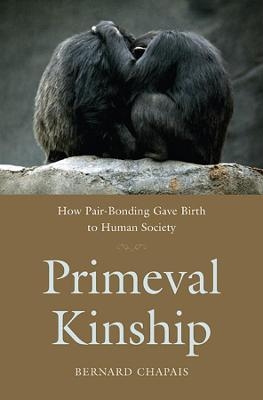
Primeval Kinship
Harvard University Press (Verlag)
978-0-674-04641-2 (ISBN)
At some point in the course of evolution—from a primeval social organization of early hominids—all human societies, past and present, would emerge. In this account of the dawn of human society, Bernard Chapais shows that our knowledge about kinship and society in nonhuman primates supports, and informs, ideas first put forward by the distinguished social anthropologist, Claude Lévi-Strauss.
Chapais contends that only a few evolutionary steps were required to bridge the gap between the kinship structures of our closest relatives—chimpanzees and bonobos—and the human kinship configuration. The pivotal event, the author proposes, was the evolution of sexual alliances. Pair-bonding transformed a social organization loosely based on kinship into one exhibiting the strong hold of kinship and affinity. The implication is that the gap between chimpanzee societies and pre-linguistic hominid societies is narrower than we might think.
Many books on kinship have been written by social anthropologists, but Primeval Kinship is the first book dedicated to the evolutionary origins of human kinship. And perhaps equally important, it is the first book to suggest that the study of kinship and social organization can provide a link between social and biological anthropology.
Bernard Chapais is Professor of Anthropology, University of Montréal.
* Preface 1. The Question of the Origin of Human Society * A Forsaken Quest * The Deep Structure of Human Societies I. Primatologists As Evolutionary Historians 2. Primatology and the Evolution of Human Behavior * The Phylogenetic Decomposition Principle * Reconstructing the Exogamy Configuration 3. The Uterine Kinship Legacy * Primatological Theories and Primate Legacies * Appraising Primate Kinship * The Domain of Uterine Kindred in Primates * How Are Uterine Kin Recognized? * The Origin of Group-wide Kinship Structures 4. From Biological to Cultural Kinship * Beyond Consanguineal Kinship * The "Genealogical Unity of Mankind" * The Bilateral Character of Human Kinship 5. The Incest Avoidance Legacy * Elements of a Primatological Theory of Incest Avoidance * Humankind's Primate Heritage 6. From Behavioral Regularities to Institutionalized Rules * The Anthropologists' Treatment of the Primate Data * The Westermarck Knot * The Morality Problem * Lessons from Comparative Anatomy II. The Exogamy Configuration Decomposed 7. Levi-Strauss and the Deep Structure of Human Society * Reciprocal Exogamy as a Deep Structuring Principle * Reciprocal Exogamy as Archaic * The Convergence beyond the Critiques * Levi-Strauss and the Primate Data 8. Human Society Out of the Evolutionary Vacuum * Leslie White and the Primate Origins of Exogamy * Elman Service and the Primitive Exogamous Band * Robin Fox and the Initial Deconstruction of Exogamy 9. The Building Blocks of Exogamy * Pinpointing the Distinctiveness of Exogamy * Reconstructing Human Society: The Task Ahead * A Once Irreducible System III. The Exogamy Configuration Reconstructed 10. The Ancestral Male Kin Group Hypothesis * The Patrilocal Band Model * Male Philopatry in Apes * The Homology Hypothesis * Updating the Ancestral Male Kin Group Hypothesis * The Gorilla Alternative 11. The Evolutionary History of Pair-Bonding * The "Invariant Core of the Family" * Pair-Bonds as Parental Partnerships * The Pitfall of the Modern Family Reference * A Two-Step Evolutionary Sequence * Monogamy as a Special Case of Polygyny * The Evolutionary History of the Sexual Division of Labor 12 Pair-Bonding and the Reinvention of Kinship * The Fundamental Equation of the Exogamy Configuration * Kinship in the Ancestral Male Kin Group * Fatherhood * The Institutionalized Denial of Paternity * The Development of Agnatic Kinship Structures 13. Biparentality and the Transformation of Siblingships * Chimpanzee Siblingships * Fatherhood and the Evolution of Strong Brotherhoods * Fatherhood and the Brother--Sister Bond * The Added Effect of Shorter Interbirth Intervals 14. Beyond the Local Group: The Rise of the Tribe * Male Pacification as a Prerequisite for the Tribe * Females as Peacemakers: The Consanguinity Route * Females as Peacemakers: The Affinity Route * The Initial Impetus * The Prelinguistic Tribe 15. From Male Philopatry to Residential Diversity * Some Serious Discrepancies * The Emergence of Residential Diversity * Ancestral Patrilocality and Grandmothering 16. Brothers, Sisters, and the Founding Principle of Exogamy * The First Step: Outmarriage * Affinal Brotherhoods and the Origin of Exogamy Rules * From Siblings-in-Law to Cross-Cousins * The "Atom of Kinship" Revisited IV. Unilineal Descent 17. Filiation, Descent, and Ideology * The African Model of Unilineal Descent Groups * The Chestnut within the Model 18. The Primate Origins of Unilineal Descent Groups * Group Membership through Birth * Kinship-Based Segmentation * The Genealogical Boundaries of Exogamy * The Unisexual Transmission of Status * Primitive Corporateness * A Multilevel Structure of Solidarity 19. The Evolutionary History of Human Descent * Female Kin Groups as Precultural Matriclans * The Residential Basis of Proto--Descent Groups * The Latent Patriclan * Matrilineality as a Male Affair 20. Conclusion: Human Society as Contingent * References * Index
| Erscheint lt. Verlag | 14.4.2010 |
|---|---|
| Zusatzinfo | 17 line illustrations |
| Verlagsort | Cambridge, Mass |
| Sprache | englisch |
| Maße | 156 x 235 mm |
| Themenwelt | Sachbuch/Ratgeber ► Gesundheit / Leben / Psychologie ► Familie / Erziehung |
| Naturwissenschaften ► Biologie ► Evolution | |
| Naturwissenschaften ► Biologie ► Zoologie | |
| Sozialwissenschaften ► Soziologie | |
| ISBN-10 | 0-674-04641-2 / 0674046412 |
| ISBN-13 | 978-0-674-04641-2 / 9780674046412 |
| Zustand | Neuware |
| Haben Sie eine Frage zum Produkt? |
aus dem Bereich


